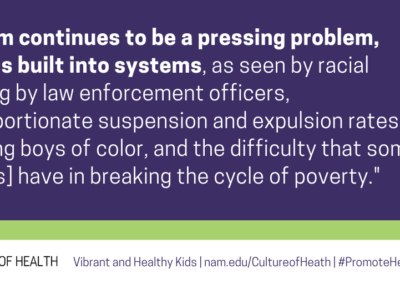
Everyone in this country deserves the opportunity to be healthy and reach their full potential no matter who they are or where they live. Yet, historically and currently marginalized populations – including the population groups American Indian or Alaska Native, Asian American, Black or African American, Hispanic or Latino or Spanish Origin, Middle Eastern or North African, and Native Hawaiian or Pacific Islander – often face barriers that have a direct and negative impact on their health.
These barriers are not random or accidental. They reflect social and economic inequality and structural racism in this country. Systems and policies determine whose air and water is clean; who has access to good schools, jobs, and affordable housing; where parks, grocery stores, and hospitals are located; which communities are safe to be active outdoors; and much more. All of these factors play a critical role in determining people’s health and well-being.
As the National Academy of Medicine (NAM) Culture of Health Program (CoHP) moves into its second phase, the NAM is highlighting statements from past CoHP reports that acknowledge structural racism’s direct and negative impact on health – and in particular the disproportionate effects on the health and well-being of historically and currently marginalized populations.
Browse the findings below, and learn more about our reports on this subject as well as the work the NAM is doing to promote health equity.


Note: The language used in the above graphics originates from the following reports. We recognize these terms reflect current understanding at the time but should remain dynamic based on further evidence and learnings, including use by community and grassroots organizations leading the way in these conversations. We do not intend for our language choices to be exclusionary and aim to be inclusive of the experiences of Black, Indigenous, and people of color – including the Latinx/Latino/Hispanic communities and Asian Americans and Pacific Islanders (AAPI) – and everyone affected by inequity in the U.S., while acknowledging and addressing structural racism and unequal allocation of power and resources as root causes of health inequity.
Consensus Reports from the Culture of Health Program
Communities in Action: Pathways to Health Equity is the first in a series of consensus reports to emerge from the National Academy of Medicine’s Culture of Health Program. This report highlights promising solutions to help create equal opportunity for health in communities, which is the foundation for health equity.
The Promise of Adolescence: Realizing Opportunity for All Youth, the second in a series, provides multiple recommendations for policy and practice that capitalize on these developmental opportunities and that address inequities – such as in health care and education – that undermine the well-being of many adolescents and leave them less able to take advantage of the promise offered by this stage of life.
Vibrant and Healthy Kids: Aligning Science, Practice, and Policy to Advance Health Equity, the third in a series, outlines steps needed to move children who are at risk for negative outcomes toward positive health trajectories and reduce health disparities.
Integrating Social Care into the Delivery of Health Care: Moving Upstream to Improve the Nation’s Health, the fourth in a series, identifies and assesses current and emerging approaches and recommends ways to expand and optimize social care in the health care setting.
Share on Social Media
Tweet this! See statements from past NAM Culture of Health Program reports that acknowledge structural racism’s direct & negative impact on health, & the disproportionate effects on the health & well-being of Black, Indigenous and people of color: nam.edu/programs/culture-of-health/structural-racism-impact-on-health #PromoteHealthEquity
Tweet this! Everyone in this country deserves the opportunity to be healthy no matter who they are or where they live. View @theNAMedicine collection of statements that acknowledge structural racism’s direct and negative impact on health: nam.edu/programs/culture-of-health/structural-racism-impact-on-health #PromoteHealthEquity


















